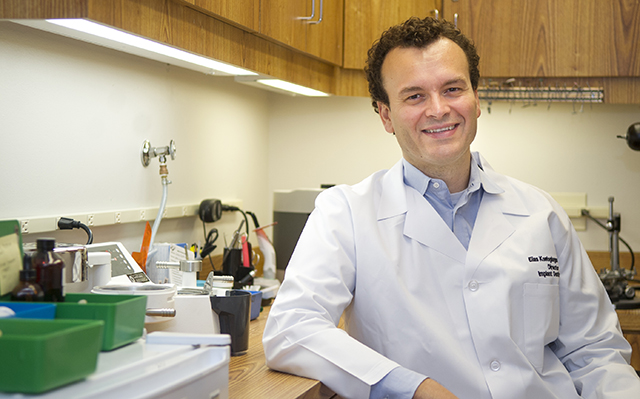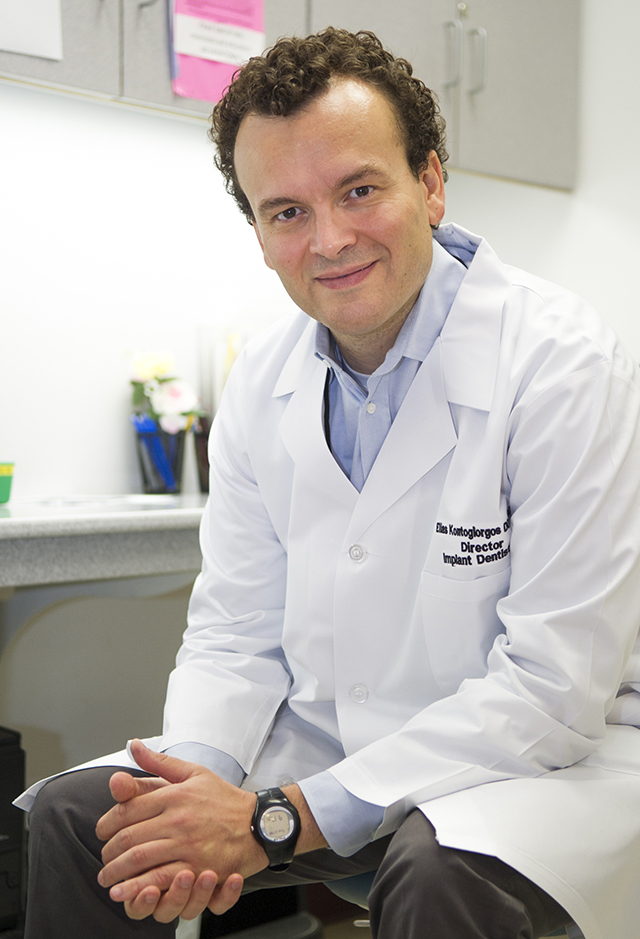Progress notes

The intersection of clinical research with coordination of patient care: It’s all in a day’s work for implant dentistry director Dr. Elias Kontogiorgos.
 Dr. Elias Kontogiorgos has been at Texas A&M University Baylor College of Dentistry since 2004. As part of a combined clinical and research program, he completed a residency in graduate prosthodontics and doctoral-level work in biomedical sciences before joining the full-time faculty in 2010. It’s led to an interesting skill set that he integrates into his role as an associate professor in restorative sciences at TAMBCD.
Dr. Elias Kontogiorgos has been at Texas A&M University Baylor College of Dentistry since 2004. As part of a combined clinical and research program, he completed a residency in graduate prosthodontics and doctoral-level work in biomedical sciences before joining the full-time faculty in 2010. It’s led to an interesting skill set that he integrates into his role as an associate professor in restorative sciences at TAMBCD.
In the clinical realm, as director of implant dentistry since 2013, Kontogiorgos helps identify patients who may be implant candidates and coaches dental students through treatment planning from start to finish, from the chair-side consult to planning the implant placement to the delivery of the final implant restoration.
In the research arena, he conducts clinical studies on new implant products before they come to market.
It’s an exciting time in the implant dentistry arena, and demand is outpacing supply. Kontogiorgos cites national statistics indicating less than 5 percent of patients who qualify as candidates for dental implants actually receive them, which is why it’s incumbent upon prosthodontists to train not only future specialists in this skill but also general practitioners. TAMBCD is on the front lines of meeting this need, not only with its curriculum for predoctoral students and its clinical research, but also with the implant continuum, a continuing education course unique to TAMBCD that is geared toward practicing dentists. Kontogiorgos serves as an instructor in this program.
Now, he talks about the growing demand for dental implants, some of the potential new products coming to market and the crucial questions all dental implant candidates should ask.
NewsStand: As implant dentistry becomes an increasingly preferred form of treatment for patients, and general dentists strive to add this discipline to their skill sets, how do prosthodontists feel about this trend?
Kontogiorgos: Prosthodontists treat the patients who have advanced and complex restorative needs. The straightforward treatments — the majority of everyday implants in dentistry — have to be done by general dentists also, because there are so few prosthodontists. Ideally we want to offer to all patients the treatment that they might want, and general dentists can handle more of the straightforward treatments. Over time they can treat advanced cases, such as restoring missing front teeth.
NewsStand: What should patients ask their dentist when considering dental implants? What questions should be at the top of their list?
Kontogiorgos: Discuss alternative options. Why an implant? What other options do I have? What are the pros and the cons? Discuss the treatment with the doctor, and make an informed decision. There are always risks involved; there is nothing without risk. You can have minimal risk or really high risk, and patients should be aware. That will be the No. 1 thing.
NewsStand: What are some of the up-and-coming implant products patients can expect in the near future?
Kontogiorgos: In October, we started a one-year, $300,000 clinical study to test the product of a new company, Natural Dental Implants. The implant is made from titanium and zirconia, but what is unique about it is the custom design of the implant. The implant is designed to replicate the root of a tooth to be extracted. The patient receives the implant the same day the extraction of the tooth is done. Our research team is unique, too. I have the pleasure to work with two exceptional doctors: Dr. Likith Reddy (director of residency training, oral and maxillofacial surgery), and Dr. Lynne Opperman (director of technology development, biomedical sciences). It is amazing to have a prosthodontist, a maxillofacial surgeon and a bone biology researcher collaborate!